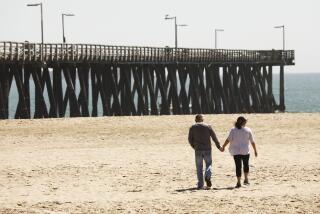Red Line Tunnel Closed by Methane Gas Release : Metro Rail: A mile-long section of the subway protect is evacuated west of downtown. Officials are unable to find the source, but say there is no immediate danger.
An unusual release of methane gas Wednesday chased 25 workers up out of the Metro Red Line subway construction project west of downtown Los Angeles, shutting down work on a one-mile section of the tunnel.
Nine fire companies, two hazardous-materials teams and a rescue ambulance responded to the 1:22 p.m. incident at 7th and Figueroa streets but construction managers and fire officials could not immediately locate the source of the gas. Los Angeles City Fire Department spokesman Mike Little said no injuries were reported.
A spokeswoman for the Los Angeles County Transportation Commission, which is building the subway, said the evacuation was calm and orderly. Only the westernmost mile of the 4.4-mile Red Line tunnel was evacuated.
The cleared section ran from the Metro Center station at 7th and Figueroa west to a station at MacArthur Park, where construction of the second leg of the subway is under way. The first leg, which costs $1.45 billion and will run between Union Station and MacArthur Park, is scheduled to open next year.
Battalion Chief Bob Aaron said the situation was of concern to the Fire Department, but did not pose an immediate danger to the construction workers or passengers on the Metro Blue Line, which shares the Metro Center station with the Red Line.
“The Blue Line stayed open the entire time,” Aaron said. “That is some indication of how safe it was. We wouldn’t have been able to do that if there had been any danger.”
Aaron said the incident was the first methane alert within the Metro Rail tunnels. The problem was anticipated because the Red Line runs through soil pocketed with methane. Tunnels are lined with plastic to help keep the gas out, but that method’s effectiveness has been called into question by the many water leaks that have been found in stations and tunnels.
The expectation of methane problems elsewhere along the line had prompted transit authorities to reroute segments of the project. Transportation commission spokeswoman Stephanie Brady said automatic gas detectors sounded the first alarm Wednesday when methane levels passed 0.0025%. By the time firefighters arrived and descended into the tunnel a few minutes later, Aaron said the level varied between 2.2% and 2.5%, with a peak of 3.2%.
Dick Jones of the California Occupational Safety and Health Administration said methane can be explosive in concentrations as low as 5.3%.
Aaron said two crews, each with six firefighters and two construction managers, started at opposite ends of the closed tunnel section and walked its length, using portable gas detectors to try to locate the source of the gas. They could not find it.
“It (the methane level) was pretty consistent throughout,” Aaron said. “If we’d found a 3.5% or 4% or 5% reading, we might have felt that we’d found a potential source--a crack in the (tunnel) lining or something. . . . It’s possible we had a gas accumulation in the sump pump (midway through the tunnel), but that’s only one possibility of many.”
Ventilation fans eventually were able to reduce the methane level to almost zero by the end of the working day, Aaron said. He added that the fans would be left running overnight as special gas detectors tested the air to see if methane returns.
The evacuation is the latest of the subway’s construction problems, which have included a $2.2-million fire in a 750-foot tunnel near Union Station in 1990 and the forced evacuation of the tunnels last year because of excessively high levels of noxious fumes.
More to Read
Sign up for Essential California
The most important California stories and recommendations in your inbox every morning.
You may occasionally receive promotional content from the Los Angeles Times.










